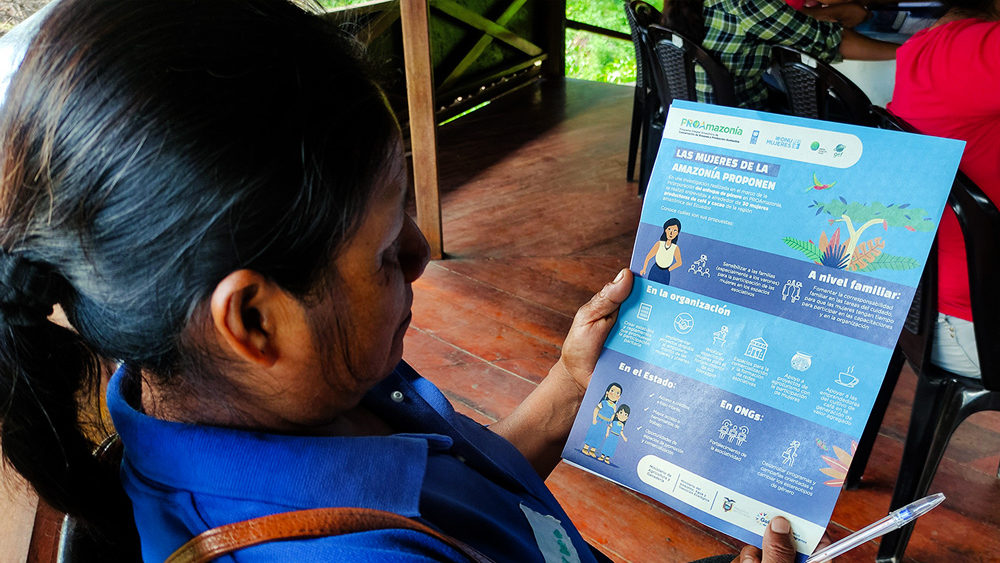The main economic activities of rural women are agriculture and livestock. They till the land and ensure the food security of their communities. Despite being so productive, in rural areas, women suffer disproportionately from the multiple aspects of poverty. In Ecuador, 35.49% of rural women live in poverty, compared to 15.5% of the national average. [1]
Rural women live in close relationship and dependence on their natural environment, especially in the Ecuadorian Amazon. However, resource management is limited by their culturally assigned roles, so they have difficulty accessing credit and participating in decision-making spaces.
The Diagnosis of the situation of Amazonian women, carried out by UN Women and PROAmazonía (a program of the National Government with UNDP support) in 2019, concluded that gender stereotypes and socially and culturally assigned roles limit the leadership of Amazonian women and much more in the rural sector. In this sense, the incorporation of the gender perspective with cultural relevance contributes to the socio-political empowerment of Amazonian women, their participation being key to the conservation of biodiversity.
Photo: UN Women
Description: Workshop of the UN Women Project – PROAmazonía
To improve the situation and position of Amazonian women, UN Women, as part of the PROAmazonía program, incorporates the gender approach to the socioenvironmental processes, sustainable and integrated management of natural resources. The program promotes sustainable productive alternatives that improve the income of the people that inhabit the Amazon, while reducing deforestation to combat climate change.
“Women’s involvement in our association was almost null. This issue was identified through the workshops, and we weere able to understand that our participation is of key importance, so we modified one of the requirements to acess the association. In the past, only owners of hearts of palm hectares were able to participate, and all the ownership deeds were registered under men’s names. Currently, that is not a requirement anymore, so more of us women are part of the Board, making decisions,” are the words of the Secretary of the Palmiculturists Association of the Ecuadorian Amazon (APAE), Giomara Pineda, who participated in the gender workshops of UN Women within the framework of PROAmazonía.
APAE accessed the competitive funds of PROAmazonía for its productive bioenterprise of heart of palm, located in the province of Orellana. Hugo Ureña, a farmer partner, stressed that economic support and training are essential to promote and maintain the production process, which benefits around 600 families from El Coca and Joya de los Sachas.
Bioenterprises are economic alternatives to stop actions that affect the environment and which, in rural areas, are mainly linked to agriculture. According to data from the Ministry of Agriculture and Livestock, peasant family farming, led by rural women, guarantees more than 60% of food production. By supporting local bioenterprises, they are strengthened as mechanisms to generate resources that improve the living conditions of the beneficiary communities to ensure the sustainability of conservation and restoration projects.
In the same way, with the UN Women – PROAmazonía workshops, it is possible to empower women to generate a wider participation, not only as producers but also in decision-making spaces within their organizations, associaitons and communities. Giomara stresses that thanks to the training they received they could identify the roles that they have in the organization “we empower ourselves and try to involve more colleagues in the Association. If there is an external hiring we prioritize women”.
The case of Giomara and the APAE exemplify the spirit in which the UN General Assembly decided to declare October 15 as the “International Day of Rural Women”. The objective is “to recognize the critical role and contribution of rural women, including Indigenous women, in promoting agricultural and rural development, improving food security and eradicating rural poverty”.


Photo: UN Women
Description: Heart of Palm Bioenterprise of the Association of Palmiculturists of the Ecuadorian Amazon in El Coca.

Photo: UN Women
Description: Giomara Pineda, secretary of he Association of Palmiculturists of the Ecuaorian Amazon on the palm farm.
[1] UNDP-MAG-MAATE (2019), Diagnosis of the situation of Amazonian women. Integral Amazonian Program for Forest Conservation and Sustainable Production, PROAmazonía. https://www.proamazonia.org/wp-content/uploads/2020/07/Diagnostico-de-mujeres-Amazonicas-3.pdf
Author: Patricia Torres – Communication Consultant for UN Women
 Español
Español English
English

Comments are closed.